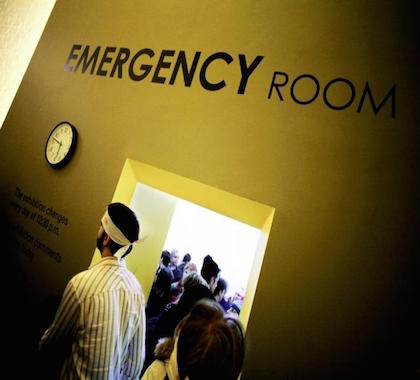The Trump administration’s Centers for Medicare and Medicaid Services issued a new guidance protecting more people from paying Obamacare penalties for 2018.
The four new qualifying circumstances, established in April, will go into effect next year, sparing millions of families from having to pay hundreds or even thousands of dollars in penalties for not having health insurance in 2018. The Tax Cuts and Jobs Act, signed into law by President Trump in December 2017, sets the penalty to zero beginning in 2019.
The new exemptions apply to (1) anyone living in a region where there is just one health insurer selling plans in an Obamacare marketplace, (2) anyone living in a region where there are no plans sold on an Obamacare exchange, (3) those living where there are no plans that don’t include abortion coverage, and (4) those unable to find a plan on the Obamacare exchange which covers the “specialty care” they need.
‘Much-Needed Relief’
Justin Haskins, a research fellow for The Heartland Institute, which publishes Health Care News, says the Trump administration’s decision will save millions of people from paying a penalty for not having “qualifying” health insurance coverage. That will allow them to buy less-expensive insurance without being punished by the government.
“With premiums and deductibles for Obamacare health insurance plans continuing to skyrocket, this move by the Trump administration will provide much-needed relief for people who either can’t afford an Obamacare plan or can’t afford to pay their high deductibles and out-of-pocket expenses,” Haskins said. “It’s incredibly immoral to force people to buy health insurance, but it’s even worse when those people can’t afford to use it.”
Dwindling Effect
Thomas Miller, a resident fellow at the American Enterprise Institute, says the new exemptions poke a few more holes in Obamacare.
“The most important development for Obamacare would be a flat-out repeal of the individual mandate in a clear-cut way, but instead, they’ve zeroed out the penalty in 2019, leaving it still nominally around for 2018, although it wasn’t real strong to begin with,” Miller said. “There is plenty of evidence a lot of people didn’t deal with the mandate in terms of income tax form processing or claim the exemptions—the numbers bounced around for particular years—so we’ve already had a substantial reduction of the potential pool.”
Low-Income Penalty
Evidence shows lower-income people were most likely to pay the mandate penalty, Miller says.
“It skewed toward the lower income or below middle class standards in general,” Miller said. “That probably indicates as much as anything some people didn’t exploit the existing rules and opportunities as well as others. They didn’t know about it or weren’t paying as much attention to it, so they were the unlucky parties getting hit with the penalties because some of those people faced high premium costs relative to their income.
“Those folks probably could have claimed an exemption and didn’t know it, or didn’t know how to use it,” Miller said. “It was unfortunate they got hit with those penalties.”
Calls for Full Repeal
Miller says it’s important for Congress and the president to remove the individual mandate explicitly and ultimately repeal ACA altogether.
“I don’t want to overstate this: the biggest impact is going to be the zero-dollar close-out in the Tax Cuts and Jobs Act of 2017, which basically makes the individual mandate just an empty suggestion without any real impact behind it,” Miller said. “So there are reasons for repealing things rather than partially disarming them, because another Congress with another vote total and partisan swings could do something differently, and another administration with another perspective could restore some things in another way. That’s why the best way to get rid of a law is to get rid of it rather than only partially disarming it, delaying it, or exempting around it.”
‘End Government Mandates’
Haskins says Obamacare is a failure that should have been repealed altogether because its underlying premise, the notion that more government intervention in the health care sector will improve the quality and affordability of health care, is false.
“Many of the most serious problems facing the health care marketplace—and there are plenty—are the creation of thousands of pages of rules, regulations, and impositions mandated by the federal and state governments,” Haskins said. “If lawmakers want to improve health care quality and access, they should work tirelessly to end government mandates and find ways to make health care more affordable by promoting direct primary care agreements and price transparency and eliminating certificate-of-need laws.
“By getting government out of the business of health care, policymakers would allow market forces and competition to lower prices and improve access without sacrificing quality,” Haskins said.
Internet Info:
Center for Consumer Information and Insurance Oversight, Centers for Medicare & Medicaid Services, “Guidance on Hardship Exemptions from the Individual Shared Responsibility Provision for Persons Experiencing Limited Issuer Options or Other Circumstances,” U.S. Department of Health and Human Services, April 9, 2018: https://www.cms.gov/CCIIO/Resources/Regulations-and-Guidance/Downloads/2018-Hardship-Exemption-Guidance.pdf
“Trump Has Quietly Saved Millions from Obamacare’s Individual Mandate;” The Hill, May 2, 2018:
“Trump Officials Create New Exemptions to Obamacare Mandate;” The Hill, April 9, 2018: http://thehill.com/policy/healthcare/382364-trump-officials-create-new-exemptions-to-obamacare-mandate





